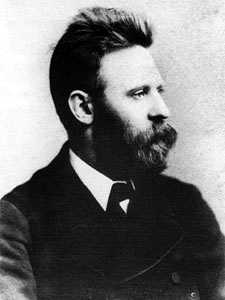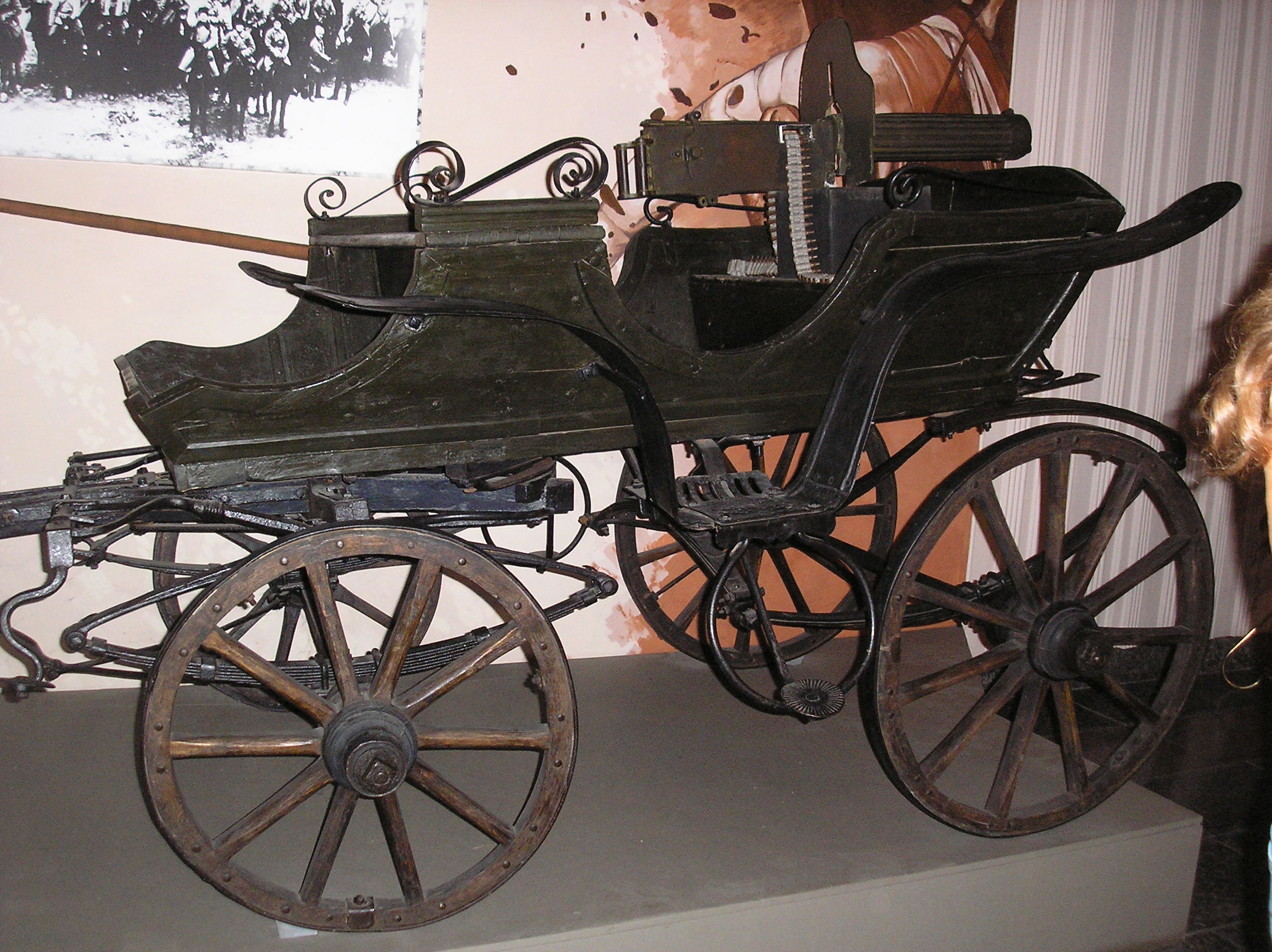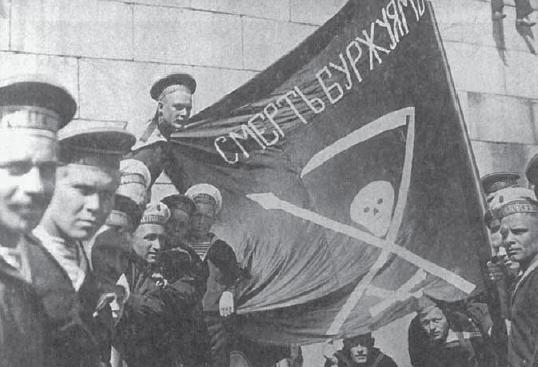|
Anarchism In Russia
Anarchism in Russia has its roots in the early mutual aid systems of the medieval republics and later in the popular resistance to the Tsarist autocracy and serfdom. Through the history of radicalism during the early 19th-century, anarchism developed out of the populist and nihilist movements' dissatisfaction with the government reforms of the time. The first Russian to identify himself as an anarchist was the revolutionary socialist Mikhail Bakunin, who became a founding figure of the modern anarchist movement within the International Workingmen's Association (IWA). In the context of the split within the IWA between the Marxists and the anarchists, the Russian Land and Liberty organization also split between a Marxist faction that supported political struggle and an anarchist faction that supported "propaganda of the deed", the latter of which went on to orchestrate the assassination of Alexander II. Specifically anarchist groups such as the Black Banner began to emer ... [...More Info...] [...Related Items...] OR: [Wikipedia] [Google] [Baidu] |
Mutual Aid (organization Theory)
In organization theory, mutual aid is a voluntary reciprocal exchange of resources and services for mutual benefit. Mutual aid projects can be a form of political participation in which people take responsibility for caring for one another and changing political conditions. Mutual aid has been used to provide people with food, medical care, and supplies, as well as provide relief from disasters, such as natural disasters and pandemics. Origins The term "mutual aid" was popularised by the anarchist philosopher Peter Kropotkin in his essay collection '' Mutual Aid: A Factor of Evolution'', which argued that cooperation, not competition, was the driving mechanism behind evolution, through biological mutualism. Kropotkin argued that mutual aid has pragmatic advantages for the survival of humans and animals and has been promoted through natural selection, and that mutual aid is arguably as ancient as human culture. This recognition of the widespread character and individual b ... [...More Info...] [...Related Items...] OR: [Wikipedia] [Google] [Baidu] |
Propaganda Of The Deed
Propaganda of the deed (or propaganda by the deed, from the French ) is specific political direct action meant to be exemplary to others and serve as a catalyst for revolution. It is primarily associated with acts of violence perpetrated by proponents of insurrectionary anarchism in the late 19th and early 20th century, including bombings and assassinations aimed at the ruling class, but also had non-violent applications. These deeds were intended to ignite the "spirit of revolt" in the people by demonstrating the state was not omnipotent and by offering hope to the downtrodden, and also to expand support for anarchist movements as the state grew more repressive in its response. In 1881, the International Anarchist Congress of London gave the tactic its approval. Anarchist origins Various definitions One of the first individuals to conceptualise propaganda by the deed was the Italian revolutionary Carlo Pisacane (1818–1857), who wrote in his "Political Testament" (1857) ... [...More Info...] [...Related Items...] OR: [Wikipedia] [Google] [Baidu] |
Soviet Union
The Soviet Union,. officially the Union of Soviet Socialist Republics. (USSR),. was a List of former transcontinental countries#Since 1700, transcontinental country that spanned much of Eurasia from 1922 to 1991. A flagship communist state, it was nominally a Federation, federal union of Republics of the Soviet Union, fifteen national republics; in practice, both Government of the Soviet Union, its government and Economy of the Soviet Union, its economy were highly Soviet-type economic planning, centralized until its final years. It was a one-party state governed by the Communist Party of the Soviet Union, with the city of Moscow serving as its capital as well as that of its largest and most populous republic: the Russian Soviet Federative Socialist Republic, Russian SFSR. Other major cities included Saint Petersburg, Leningrad (Russian SFSR), Kyiv, Kiev (Ukrainian Soviet Socialist Republic, Ukrainian SSR), Minsk (Byelorussian Soviet Socialist Republic, Byelorussian SSR), Tas ... [...More Info...] [...Related Items...] OR: [Wikipedia] [Google] [Baidu] |
Makhnovshchina
The Makhnovshchina () was an attempt to form a stateless anarchist society in parts of Ukraine during the Russian Revolution of 1917–1923. It existed from 1918 to 1921, during which time free soviets and libertarian communes operated under the protection of Nestor Makhno's Revolutionary Insurgent Army. The area had a population of around seven million. The Makhnovshchina was established with the capture of Huliaipole by Makhno's forces on 27 November 1918. An insurgent staff was set up in the city, which became the territory's ''de facto'' capital. Russian forces of the White movement, under Anton Denikin, occupied part of the region and formed a temporary government of Southern Russia in March 1920, resulting in the ''de facto'' capital being briefly moved to Katerynoslav (modern-day Dnipro). In late March 1920, Denikin's forces retreated from the area, having been driven out by the Red Army in cooperation with Makhno's forces, whose units conducted guerrilla warfa ... [...More Info...] [...Related Items...] OR: [Wikipedia] [Google] [Baidu] |
Revolutionary Insurrectionary Army Of Ukraine
The Revolutionary Insurgent Army of Ukraine ( uk, Революційна Повстанська Армія України), also known as the Black Army or as Makhnovtsi ( uk, Махновці), named after their leader Nestor Makhno, was an anarchist army formed largely of Ukrainian peasants and workers during the Russian Civil War of 1917–1922. They protected the operation of " free soviets" and libertarian communes by the Makhnovshchina, an attempt to form a stateless libertarian communist society from 1918 to 1921 during the Ukrainian War of Independence. They were founded and inspired based on the Black Guards. History Background The roots of militant anarchism in Ukraine can be traced back to the activities of the Zaporozhian Cossacks, who established their own " free territory" in the Wild Fields, where they practiced a decentralized, democratic and egalitarian mode of organization until their defeat by the Russian Empire at the turn of the 19th century. La ... [...More Info...] [...Related Items...] OR: [Wikipedia] [Google] [Baidu] |
Kronstadt Rebellion
The Kronstadt rebellion ( rus, Кронштадтское восстание, Kronshtadtskoye vosstaniye) was a 1921 insurrection of Soviet sailors and civilians against the Bolsheviks, Bolshevik government in the Russian Soviet Federative Socialist Republic, Russian SFSR port city of Kronstadt. Located on Kotlin Island in the Gulf of Finland, Kronstadt defended the former capital city, Petrograd, as the base of the Baltic Fleet. For sixteen days in March 1921, rebels in Kronstadt's naval fortress rose in opposition to the Soviet government they had helped to consolidate. Led by Stepan Petrichenko, it was the last major left-wing uprisings against the Bolsheviks, revolt against the Bolshevik regime on Russian territory during the Russian Civil War. Disappointed in the direction of the Bolshevik government, the rebels—whom Leon Trotsky himself had praised earlier as "adornment and pride of the revolution"—demanded a series of reforms: reduction in Bolshevik power, newly elect ... [...More Info...] [...Related Items...] OR: [Wikipedia] [Google] [Baidu] |
Soviet Democracy
Soviet democracy, or council democracy, is a political system in which the rule of the population is exercised by directly elected '' soviets'' (Russian for "council"). The councils are directly responsible to their electors and bound by their instructions using a delegate model of representation. Such an imperative mandate is in contrast to a free mandate, in which the elected delegates are only responsible to their conscience. Delegates may accordingly be dismissed from their post at any time or be voted out ( recall). In a Soviet democracy, voters are organized in basic units, for example the workers of a company, the inhabitants of a district, or the soldiers of a barracks. They directly send the delegates as public functionaries, which act as legislators, government and courts in one. In contrast to earlier democracy models according to John Locke and Montesquieu, there is no separation of powers. The councils are elected on several levels: At the residential and busi ... [...More Info...] [...Related Items...] OR: [Wikipedia] [Google] [Baidu] |
Left-wing Uprisings Against The Bolsheviks
The left-wing uprisings against the Bolsheviks, known in anarchist literature as the Third Russian Revolution, were a series of rebellions, uprisings, and revolts against the Bolsheviks by oppositional left-wing organizations and groups that started soon after the October Revolution, continued through the years of the Russian Civil War, and lasted into the first years of Bolshevik rule of the Soviet Union. They were led or supported by left-wing groups such as some factions of the Socialist Revolutionary Party, Left Socialist-Revolutionaries, Mensheviks, and anarchists. Generally, the uprisings began in 1918 because of the Bolshevik assault on Soviet democracy, the signing of the Treaty of Brest-Litovsk (which many saw as giving overly generous concessions to the Central Powers also seen by some as limiting the revolutionary potential causing the workers, soldiers and peasantry outside the Soviet state to rebel against the continuing strife caused by the war), and opposition to B ... [...More Info...] [...Related Items...] OR: [Wikipedia] [Google] [Baidu] |
Treaty Of Brest-Litovsk
The Treaty of Brest-Litovsk (also known as the Treaty of Brest in Russia) was a separate peace treaty signed on 3 March 1918 between Russia and the Central Powers (Germany, Austria-Hungary, Bulgaria, and the Ottoman Empire), that ended Russia's participation in World War I. The treaty was signed at German-controlled Brest-Litovsk ( pl, Brześć Litewski; since 1945, Brest, now in modern Belarus), after two months of negotiations. The treaty was agreed upon by the Russians to stop further invasion. As a result of the treaty, Soviet Russia defaulted on all of Imperial Russia's commitments to the Allies and eleven nations became independent in eastern Europe and western Asia. Under the treaty, Russia lost all of Ukraine and most of Belarus, as well as its three Baltic republics of Lithuania, Latvia, and Estonia (so-called Baltic governorates in the Russian Empire), and these three regions became German vassal states under German princelings. Russia also ceded its province of K ... [...More Info...] [...Related Items...] OR: [Wikipedia] [Google] [Baidu] |
Bolsheviks
The Bolsheviks (russian: Большевики́, from большинство́ ''bol'shinstvó'', 'majority'),; derived from ''bol'shinstvó'' (большинство́), "majority", literally meaning "one of the majority". also known in English as the Bolshevists,. It signifies both Bolsheviks and adherents of Bolshevik policies. were a far-left, revolutionary Marxist faction founded by Vladimir Lenin that split with the Mensheviks from the Marxist Russian Social Democratic Labour Party (RSDLP), a revolutionary socialist political party formed in 1898, at its Second Party Congress in 1903. After forming their own party in 1912, the Bolsheviks took power during the October Revolution in the Russian Republic in November 1917, overthrowing the Provisional Government of Alexander Kerensky, and became the only ruling party in the subsequent Soviet Russia and later the Soviet Union. They considered themselves the leaders of the revolutionary proletariat of Russia. Their bel ... [...More Info...] [...Related Items...] OR: [Wikipedia] [Google] [Baidu] |
Russian Revolution
The Russian Revolution was a period of political and social revolution that took place in the former Russian Empire which began during the First World War. This period saw Russia abolish its monarchy and adopt a socialist form of government following two successive revolutions and a bloody civil war. The Russian Revolution can also be seen as the precursor for the other European revolutions that occurred during or in the aftermath of WWI, such as the German Revolution of 1918. The Russian Revolution was inaugurated with the February Revolution in 1917. This first revolt focused in and around the then-capital Petrograd (now Saint Petersburg). After major military losses during the war, the Russian Army had begun to mutiny. Army leaders and high ranking officials were convinced that if Tsar Nicholas II abdicated, the domestic unrest would subside. Nicholas agreed and stepped down, ushering in a new government led by the Russian Duma (parliament) which became the Russian ... [...More Info...] [...Related Items...] OR: [Wikipedia] [Google] [Baidu] |
1905 Russian Revolution
The Russian Revolution of 1905,. also known as the First Russian Revolution,. occurred on 22 January 1905, and was a wave of mass political and social unrest that spread through vast areas of the Russian Empire. The mass unrest was directed against the Tsar, nobility, and ruling class. It included worker strikes, peasant unrest, and military mutinies. In response to the public pressure, Tsar Nicholas II enacted some constitutional reform (namely the October Manifesto). This took the form of establishing the State Duma, the multi-party system, and the Russian Constitution of 1906. Despite popular participation in the Duma, the parliament was unable to issue laws of its own, and frequently came into conflict with Nicholas. Its power was limited and Nicholas continued to hold the ruling authority. Furthermore, he could dissolve the Duma, which he often did. The 1905 revolution was primarily spurred by the international humiliation as a result of the Russian defeat in the Russo-J ... [...More Info...] [...Related Items...] OR: [Wikipedia] [Google] [Baidu] |







.jpg)

